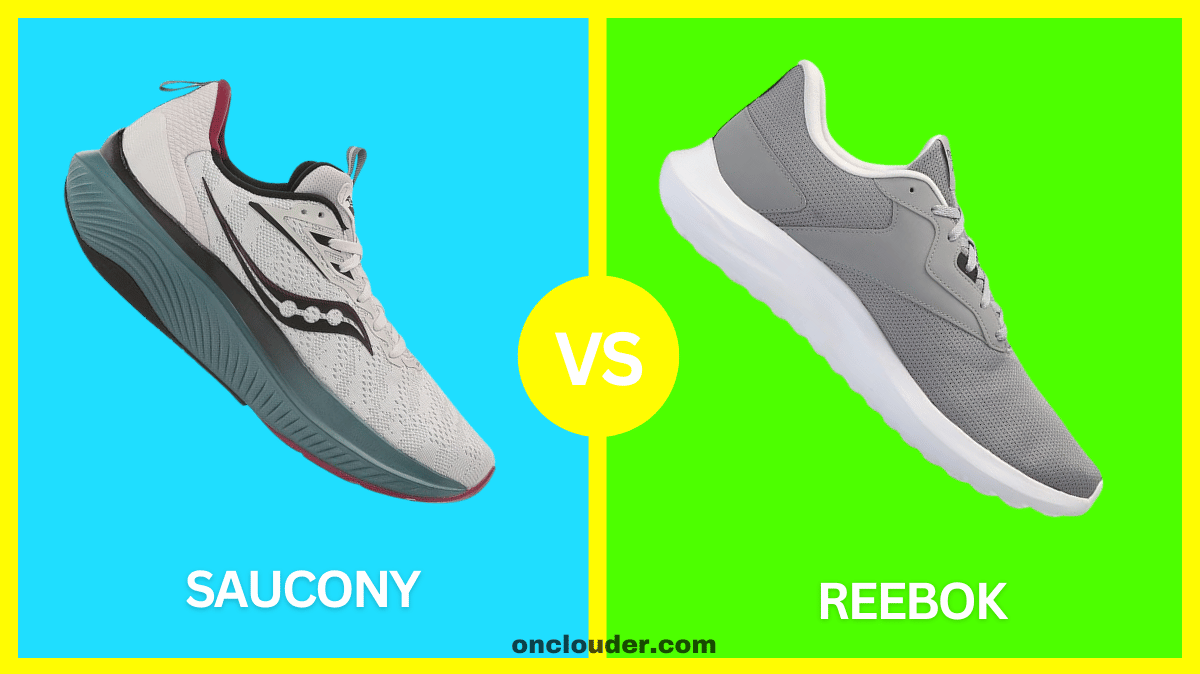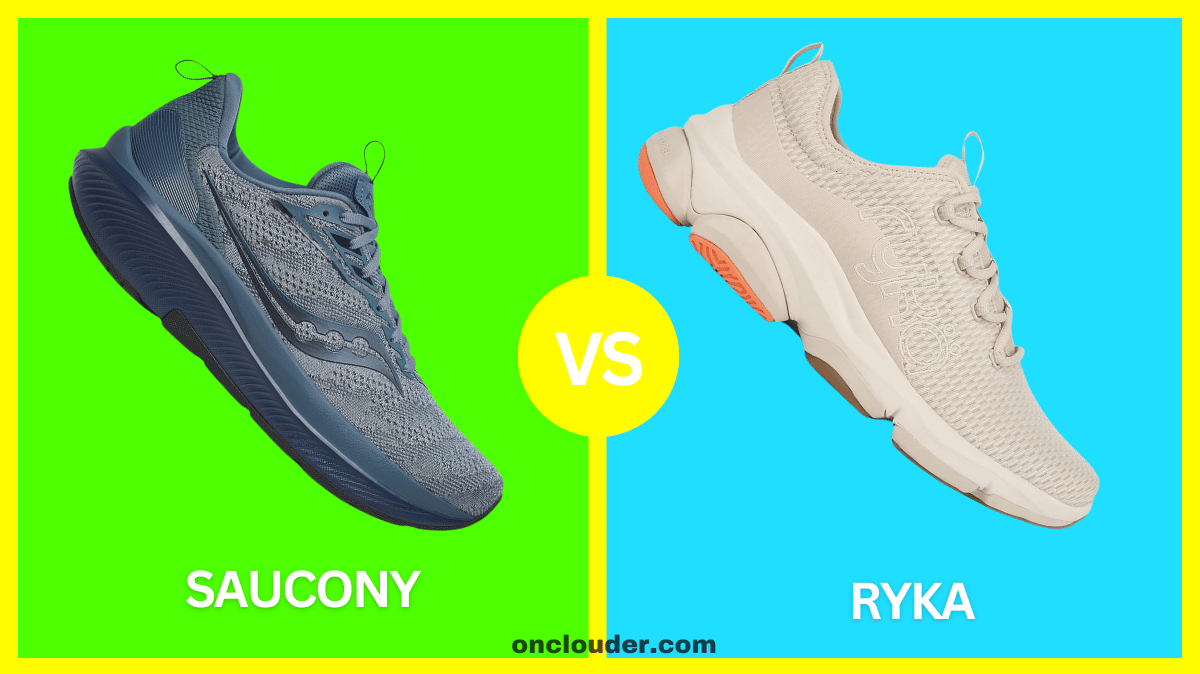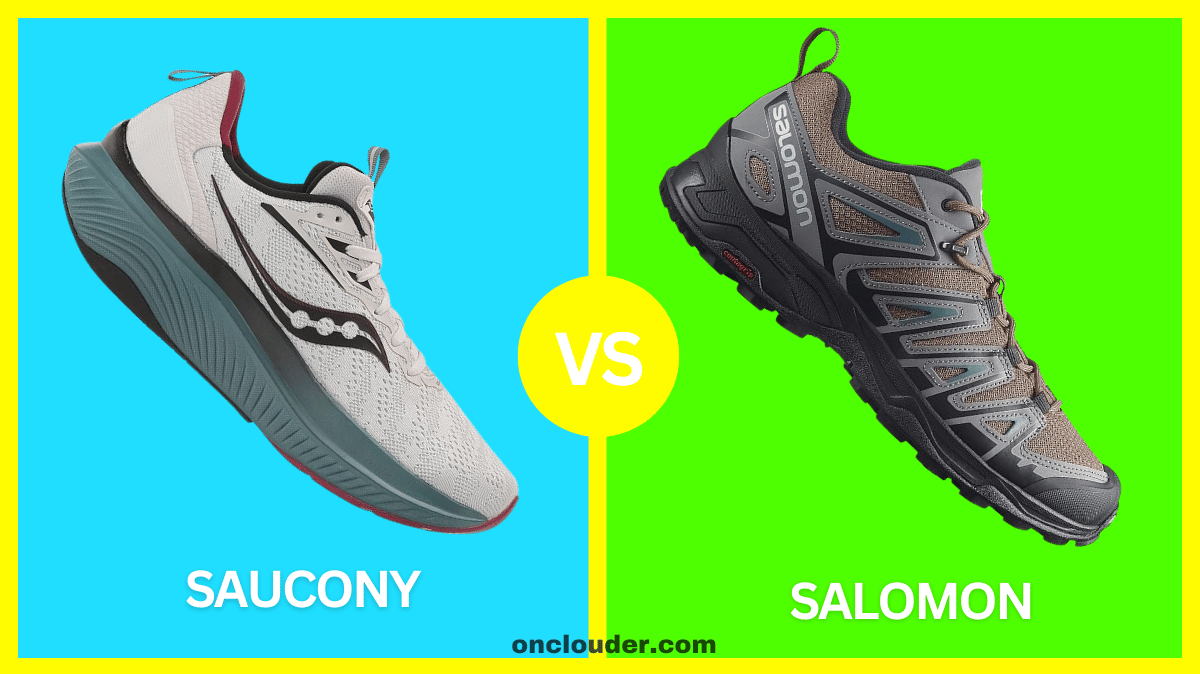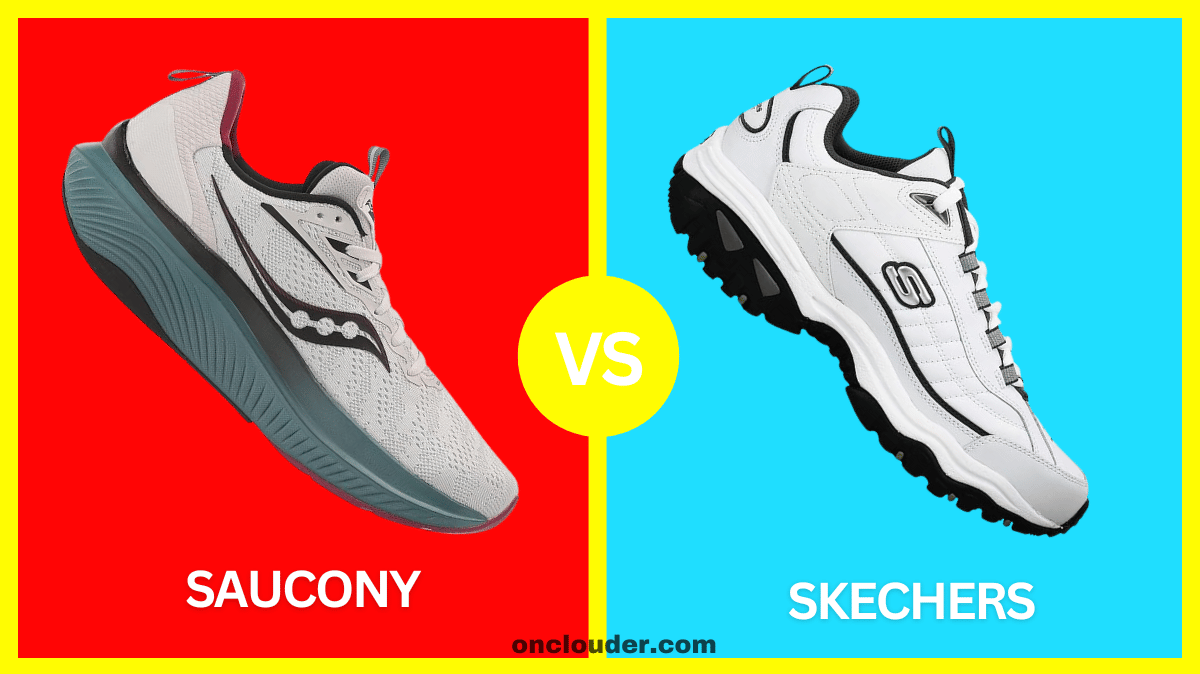Are you trying to decide between Saucony and Reebok shoes? Don’t worry, we’ve got you covered.
We’ll compare these two popular shoe brands to help you figure out which one might be the best fit for you.
We’ll look at things like how comfy they are, how long they last, and what styles they come in.
By the end, you’ll be a shoe expert!

Contents
- 1 Quick Comparison: Saucony vs Reebok Shoes
- 2 What’s the Big Deal About Saucony and Reebok?
- 3 Durability: Which Shoes Last Longer?
- 4 Breathing: Keeping Your Feet Cool
- 5 Cushioning: Soft Steps or Firm Footing?
- 6 Shoe Fit: Finding Your Perfect Match
- 7 Stability: Keeping You Steady
- 8 Comfort: Happy Feet, Happy You
- 9 Quality: Built to Last
- 10 Style: Looking Good on Your Feet
- 11 Size: Finding the Right Fit
- 12 Material: What Are These Shoes Made Of?
- 13 Weight: Light as a Feather or Solid and Strong?
- 14 Flexibility: Bend and Flex
- 15 Water Resistance: Staying Dry
- 16 Sole: The Foundation of Your Shoe
- 17 User Reviews and Ratings
- 18 Pricing
- 19 Pros and Cons
- 20 Conclusion
- 21 Frequently Asked Questions
Quick Comparison: Saucony vs Reebok Shoes
The main difference between Saucony and Reebok shoes is their focus. Saucony is known for making great running shoes with lots of cushioning and support for runners. Reebok makes shoes for all kinds of activities, from running to gym workouts to everyday wear, offering more variety in styles and uses.
| FeatureSauconyReebokBest ForRunningMany activitiesCushioningVery soft and bouncyVaries by shoe typeFitTrue to size, many width optionsMight run small, fewer width optionsStabilityGreat for runnersGood for various workoutsWeightUsually very lightVaries (light running shoes, heavier training shoes)BreathabilityVery breathableGood breathabilityDurabilityLong-lasting for runningTough for different activitiesStyle OptionsSporty, colorfulWide range (sporty, casual, trendy)Price Range$60 to $150+$50 to $130+Special FeaturesGreat for overpronationGood for CrossFit |
|---|
In summary: Saucony and Reebok both make good shoes, but they’re a bit different. Saucony is really great if you love running. Their shoes are super comfy, light, and help your feet stay in the right position when you run.
Reebok is awesome if you like to do lots of different activities. They make shoes for running, gym workouts, and just hanging out. Reebok has more style choices, while Saucony focuses on making the best running shoes they can.
What’s the Big Deal About Saucony and Reebok?
Before we dive into the details, let’s talk about why these brands are so popular:
Saucony: The Running Champ
Saucony (say it like “sock-uh-knee”) is a brand that’s been around since 1898! They’re known for making awesome running shoes. If you love to run or play sports that involve a lot of running, Saucony might be your new best friend.
Reebok: The All-Around Player
Reebok has been making shoes since 1895. They make all kinds of shoes – for running, CrossFit, and even just looking cool. Reebok is great if you want shoes that can do a bit of everything.
Now, let’s compare these brands in different areas to see how they stack up!
Durability: Which Shoes Last Longer?
When you buy shoes, you want them to last, right? Let’s see how Saucony and Reebok compare:
Saucony’s Durability
Saucony shoes are built to last, especially for runners. They use strong materials that can handle lots of miles on the road or trail. Many runners say their Saucony shoes last for 400-500 miles of running!
Reebok’s Durability
Reebok shoes are also pretty tough. They’re great for different types of exercise, not just running. Reebok uses durable materials that can handle gym workouts, sports, and everyday wear.
Durability Winner: It’s a tie! Both brands make shoes that last a long time if you take care of them.
Breathing: Keeping Your Feet Cool
Nobody likes sweaty, stinky feet. Let’s see how these brands help keep your feet fresh:
Saucony’s Breathability
Saucony uses special mesh materials in many of their shoes. This mesh lets air flow in and out, keeping your feet cool and dry. It’s super helpful when you’re running and your feet get hot.
Reebok’s Breathability
Reebok also uses breathable materials in their shoes. Many Reebok shoes have small holes or special fabrics that let air move around your feet. This is great for workouts or just walking around on a hot day.
Breathability Winner: Another tie! Both brands do a good job of keeping your feet cool.
Cushioning: Soft Steps or Firm Footing?
Cushioning is what makes shoes feel soft or firm when you walk or run. Let’s compare:
Saucony’s Cushioning
Saucony is famous for its cushioning, especially in running shoes. They use special foam that’s soft but also bouncy. This helps absorb shock when your foot hits the ground, making running more comfortable.
Reebok’s Cushioning
Reebok uses different types of cushioning for different shoes. Their running shoes have soft cushioning, while their CrossFit shoes have firmer cushioning for stability during workouts.
Cushioning Winner: Saucony takes the lead here, especially for runners who want a soft, bouncy feel.
Shoe Fit: Finding Your Perfect Match
Getting the right fit is super important. Let’s see how these brands handle different foot shapes:
Saucony’s Fit
Saucony offers shoes in different widths, which is great if you have narrow or wide feet. They also have a special system to measure your foot shape, helping you find the perfect fit.
Reebok’s Fit
Reebok shoes tend to have a “standard” fit that works for most people. Some of their shoes come in wide sizes too. Reebok is working on making their shoes fit even better for different foot shapes.
Fit Winner: Saucony wins this round because they offer more options for different foot shapes.

Stability: Keeping You Steady
Stability helps prevent injuries and keeps you balanced. Here’s how our brands compare:
Saucony’s Stability
Saucony makes special stability shoes for runners whose feet roll inward too much (called overpronation). These shoes have extra support to keep your feet aligned.
Reebok’s Stability
Reebok focuses on stability in their training shoes, like those for CrossFit. These shoes have a wide base and firm support to keep you steady during workouts.
Stability Winner: It depends on what you need! Saucony is better for running stability, while Reebok is great for workout stability.
Comfort: Happy Feet, Happy You
Comfort is key when it comes to shoes. Let’s see which brand might feel best on your feet:
Saucony’s Comfort
Saucony is known for making super comfy running shoes. They use soft materials and lots of cushioning to make your feet feel great, even on long runs.
Reebok’s Comfort
Reebok shoes are comfortable too, but in a different way. They focus on making shoes that fit well and support your feet during different activities.
Comfort Winner: For overall comfort, especially in running shoes, Saucony takes the lead.

Quality: Built to Last
Quality means how well the shoes are made. Let’s compare:
Saucony’s Quality
Saucony is known for high-quality shoes, especially for serious runners. They use top-notch materials and pay attention to small details in their shoe design.
Reebok’s Quality
Reebok also makes good quality shoes. They’re always trying new technologies to make their shoes better and more durable.
Quality Winner: It’s a close call, but Saucony edges out slightly for their focus on high-quality running shoes.
Style: Looking Good on Your Feet
Style is important too – you want shoes that look cool! Here’s how our brands stack up:
Saucony’s Style
Saucony shoes have a sporty, runner-friendly look. They come in lots of bright colors and cool designs, especially in their running shoes.
Reebok’s Style
Reebok offers a wider range of styles. They have sporty shoes, but also shoes that look great for everyday wear. Reebok often teams up with celebrities and designers to make unique styles.
Style Winner: If you want more variety, Reebok wins this round.
Size: Finding the Right Fit
Getting the right size is super important. Here’s what you need to know:
Saucony’s Sizing
Saucony shoes usually fit true to size. This means if you normally wear a size 7, a size 7 in Saucony will probably fit you well. They also offer half sizes and different widths.
Reebok’s Sizing
Reebok shoes can sometimes run a bit small. You might need to go up half a size in some Reebok shoes. They also offer half sizes, but fewer width options than Saucony.
Sizing Winner: Saucony wins for their consistent sizing and more width options.
Material: What Are These Shoes Made Of?
The materials used in shoes affect how they feel, last, and look. Let’s compare:
Saucony’s Materials
Saucony uses high-quality materials in their shoes. This includes:
- Breathable mesh for the upper part of the shoe
- Special foams for cushioning, like PWRRUN and EVERUN
- Durable rubber for the soles
Reebok’s Materials
Reebok also uses good materials, including:
- Flexweave fabric for a strong but flexible upper
- Floatride foam for cushioning
- High-abrasion rubber for durable soles
Materials Winner: It’s a tie! Both brands use great materials in their shoes.
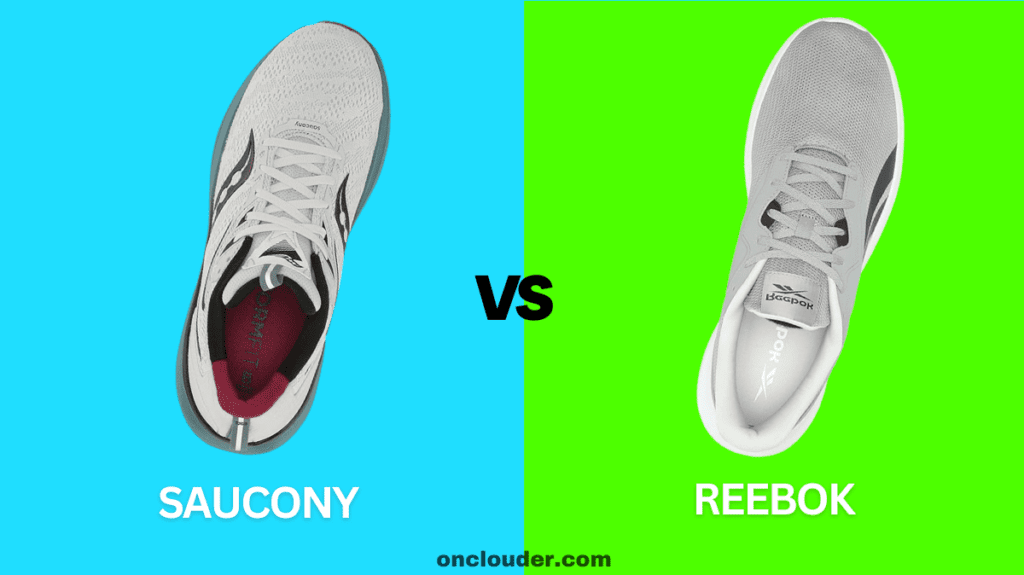
Weight: Light as a Feather or Solid and Strong?
The weight of your shoes can affect how they feel when you wear them. Let’s weigh in:
Saucony’s Weight
Saucony focuses on making lightweight running shoes. Many of their popular models weigh less than 10 ounces, which is pretty light!
Reebok’s Weight
Reebok’s shoe weights vary depending on the type. Their running shoes are usually light, while their training shoes might be a bit heavier for extra support.
Weight Winner: For lightweight options, especially in running shoes, Saucony takes the lead.
Flexibility: Bend and Flex
Flexible shoes can make running and walking more comfortable. Here’s how our brands compare:
Saucony’s Flexibility
Saucony designs their shoes to be flexible in the right places. This helps your foot move naturally when you run or walk.
Reebok’s Flexibility
Reebok’s flexibility depends on the shoe type. Their running shoes are usually pretty flexible, while their training shoes might be a bit stiffer for support during workouts.
Flexibility Winner: For running shoes, Saucony wins. For training shoes, Reebok might be better.
Water Resistance: Staying Dry
Sometimes you need shoes that can handle a little water. Let’s see how these brands do:
Saucony’s Water Resistance
Some Saucony shoes, especially their trail running models, have water-resistant features. These help keep your feet dry on wet trails or in light rain.
Reebok’s Water Resistance
Reebok doesn’t focus as much on water resistance in their regular shoes. However, they do make some waterproof options for outdoor activities.
Water Resistance Winner: Saucony takes this one, especially for their trail running shoes.
Sole: The Foundation of Your Shoe
The sole is the bottom part of the shoe that touches the ground. It’s super important! Let’s compare:
Saucony’s Soles
Saucony uses different types of rubber in their soles to provide good grip and durability. They often use a special rubber called XT-900 that’s really tough and grippy.
Reebok’s Soles
Reebok also uses durable rubber in their soles. For their training shoes, they use a special rubber that’s great for grip during workouts.
Sole Winner: It’s a tie! Both brands make good, durable soles for different activities.

User Reviews and Ratings
| Brand | Model | User Rating | Price Range |
|---|---|---|---|
| Saucony | Ride 15 | ⭐⭐⭐⭐½ (4.5/5) | $130-$140 |
| Saucony | Kinvara 13 | ⭐⭐⭐⭐ (4/5) | $110-$120 |
| Reebok | Nano X2 | ⭐⭐⭐⭐ (4/5) | $130-$140 |
| Reebok | Floatride Energy 4 | ⭐⭐⭐⭐ (4/5) | $100-$110 |
Pricing
| Brand | Budget-friendly | Mid-range | High-end |
|---|---|---|---|
| Saucony | $60-$80 | $100-$130 | $150+ |
| Reebok | $50-$70 | $80-$120 | $130+ |
Pros and Cons
| Brand | Pros | Cons |
|---|---|---|
| Saucony | Very comfy for running | Not as many style choices |
| Lots of cushioning | Might be too soft for some workouts | |
| Great for people with wide feet | Can be expensive | |
| Super light | Mainly good for running | |
| Good for long distances | Fewer options for casual wear | |
| Reebok | Good for many activities | Might not be the best for serious runners |
| Lots of style choices | Some shoes might feel less cushioned | |
| Often less expensive | Can run small in size | |
| Great for gym workouts | Fewer width options | |
| Good for everyday wear | Not as specialized for running |
Conclusion
After comparing Saucony and Reebok, we can see that both brands have their strengths. Here’s a quick summary to help you choose:
Choose Saucony if:
- You’re a runner looking for comfortable, cushioned shoes
- You need shoes with great stability for running
- You want lightweight shoes with good breathability
Choose Reebok if:
- You want versatile shoes for different activities
- You’re into CrossFit or other intense workouts
- You like having lots of style options
Remember, the best shoe for you depends on your personal needs and preferences. It’s always a good idea to try on shoes before buying them if you can!
Frequently Asked Questions
Are Saucony shoes good for everyday wear?
Yes! While Saucony specializes in running shoes, many of their models are comfortable for everyday use too.
Do Reebok shoes last long?
Yes, Reebok shoes are generally durable. How long they last depends on how often you wear them and what you use them for.
Which brand is better for wide feet?
Saucony offers more width options, so they might be better if you have wide feet.
Are Reebok shoes good for running?
Yes, Reebok makes good running shoes. However, Saucony is more focused on running and might have more options for serious runners.
Can I use Saucony shoes for gym workouts?
While Saucony shoes are designed for running, some models can work well for light gym workouts. For intense training, Reebok might be a better choice.

